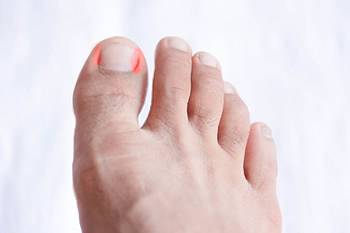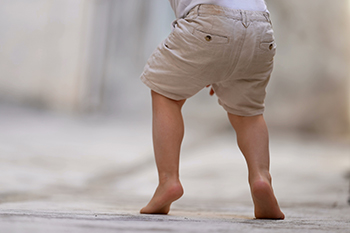

Cellulitis is a bacterial skin infection that affects the deeper layers of the skin and underlying tissue. It occurs when bacteria enter through a break in the skin, leading to redness, swelling, and pain. In the case of the toenails, cellulitis can develop from other infections, such as athlete’s foot or an ingrown toenail. Athlete’s foot causes cracks in the skin between the toes, which can allow bacteria to invade, while an ingrown toenail can lead to infection in the surrounding tissue, causing redness, swelling, and pain. Symptoms of cellulitis in the toenails include warmth, redness, swelling, and tenderness in the affected area. The skin may feel tight and painful, and there may be drainage or pus if the infection worsens. If left untreated, cellulitis can spread and cause serious complications. A podiatrist can treat cellulitis by prescribing antibiotics, draining any abscesses, and addressing the underlying cause, such as treating athlete’s foot or correcting an ingrown toenail. If you are dealing with this condition, it is suggested that you make an appointment with a podiatrist for care.
Ingrown toenails can become painful if they are not treated properly. For more information about ingrown toenails, contact Dr. Edward D. Hutson of Easton, PA. . Our doctor can provide the care you need to keep you pain-free and on your feet.
Ingrown Toenails
Ingrown toenails occur when a toenail grows sideways into the bed of the nail, causing pain, swelling, and possibly infection.
Causes
Prevention
Because ingrown toenails are not something found outside of shoe-wearing cultures, going barefoot as often as possible will decrease the likeliness of developing ingrown toenails. Wearing proper fitting shoes and using proper cutting techniques will also help decrease your risk of developing ingrown toenails.
Treatment
Ingrown toenails are a very treatable foot condition. In minor cases, soaking the affected area in salt or antibacterial soaps will not only help with the ingrown nail itself, but also help prevent any infections from occurring. In more severe cases, surgery is an option. In either case, speaking to your podiatrist about this condition will help you get a better understanding of specific treatment options that are right for you.
If you have any questions please feel free to contact our offices located in Easton, and Northampton, PA . We offer the newest diagnostic and treatment technologies for all your foot and ankle needs.

When a child walks on their toes without a medical cause, known as idiopathic toe walking, finding the right solution can be challenging. Two common devices used to address this issue are ankle-foot orthoses, or AFOs, and foot orthoses, FOs. AFOs tend to be more effective in altering walking patterns during treatment. However, some children return to toe walking once the device is removed. FOs offer a more comfortable and less restrictive option, making them more appealing to children and parents. Although FOs may not correct the walking pattern as strongly during use, children often maintain similar improvements when not wearing them. The balance between effectiveness and comfort is key when choosing a treatment. A podiatrist can help determine which option is most suitable for your child’s specific needs and lifestyle. If your child is toe walking, it is suggested that you see a podiatrist for a proper diagnosis and treatment.
If you are having discomfort in your feet and would like to try orthotics, contact Dr. Edward D. Hutson from Easton, PA. . Our doctor can provide the care you need to keep you pain-free and on your feet.
What Are Orthotics?
Orthotics are inserts you can place into your shoes to help with a variety of foot problems such as flat feet or foot pain. Orthotics provide relief and comfort for minor foot and heel pain but can’t correct serious biomechanical problems in your feet.
Over-the-Counter Inserts
Orthotics come in a wide variety of over-the-counter inserts that are used to treat foot pain, heel pain, and minor problems. For example, arch supports can be inserted into your shoes to help correct overarched or flat feet, while gel insoles are often used because they provide comfort and relief from foot and heel pain by alleviating pressure.
Prescription Orthotics
If over-the-counter inserts don’t work for you or if you have a more severe foot concern, it is possible to have your podiatrist prescribe custom orthotics. These high-quality inserts are designed to treat problems such as abnormal motion, plantar fasciitis, and severe forms of heel pain. They can even be used to help patients suffering from diabetes by treating foot ulcers and painful calluses and are usually molded to your feet individually, which allows them to provide full support and comfort.
If you are experiencing minor to severe foot or heel pain, it’s recommended to speak with your podiatrist about the possibilities of using orthotics. A podiatrist can determine which type of orthotic is right for you and allow you to take the first steps towards being pain-free.
If you have any questions please contact our offices located in Easton, and Northampton, PA . We offer the newest diagnostic and treatment technologies for all your foot and ankle needs.